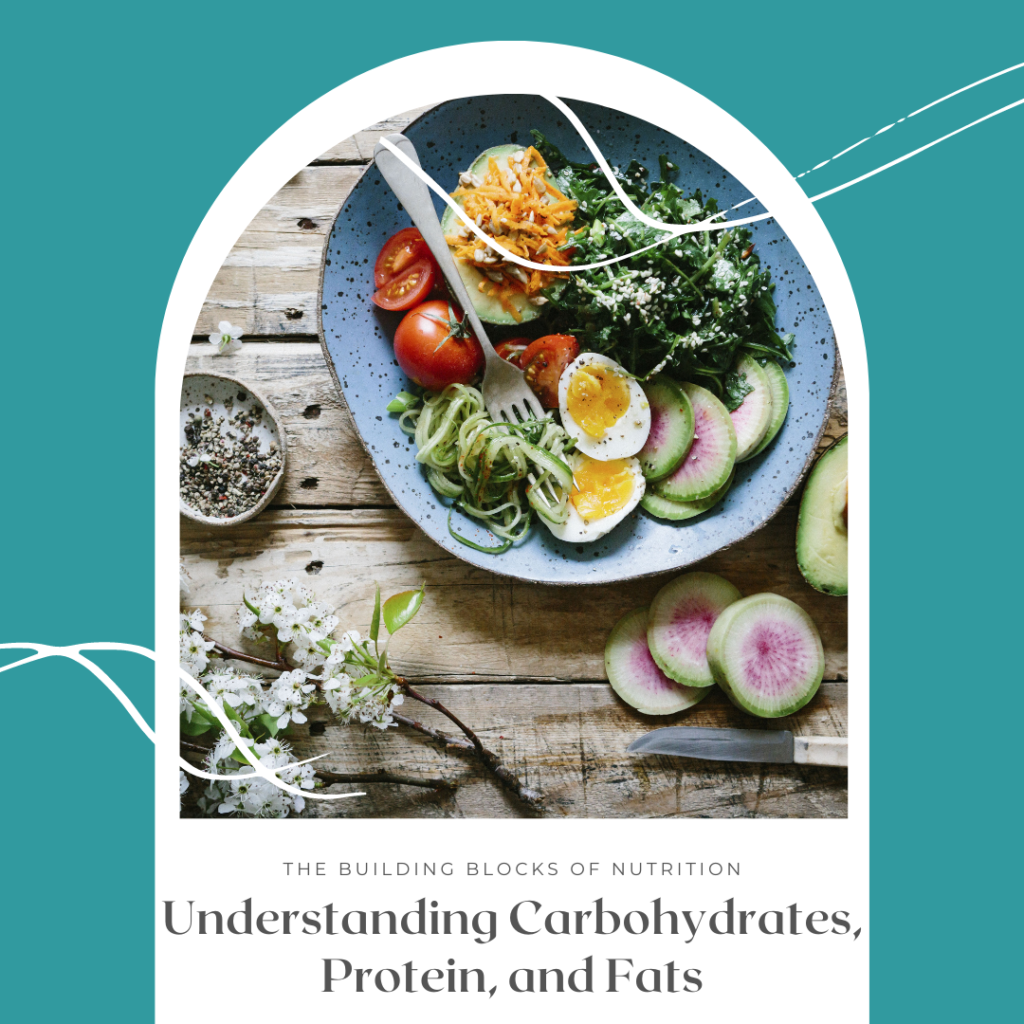The Building Blocks of Nutrition

Looking at my previous posts, I think I missed to introduce the building blocks of nutrition. So, let’s start from the beginning, as we all know, in What does ” health” mean? I shared that nutrition is a critical discipline that helps you love your body and understand its needs. It supports self-control. Also, nutrition helps you detoxify and clear out any toxins in your body. And all centered and dependable on what food gives, including MACROnutrients, meaning nutrients needed in large quantities. Any deficiency or excess intake in any of them, it leads to clear deterioration of health. Therefore, it’s important to understand the three macronutrients that make up our food: carbohydrates, protein, and fats. In this blog post, we’ll explore each of these macronutrients and their role in our diets.
Understanding Carbohydrates, Protein, and Fats
Carbohydrates
Carbohydrates are the body’s primary source of energy. And what is meant by “primary’ is the readiness for absorption and usage for energy. If carbs are available, they’re used first, even if the body is in need of protein and fats. The reason is simply, it breaks down to glucose the fastest. Which is then, the body uses that glucose for energy. Glucoses excesses are converted to fats or stored as glycogen (glucose stores). Carbohydrates sources include: bread, pasta, rice, and fruits.
There are two types of carbohydrates: simple and complex. Simple carbohydrates, also known as sugars, are available in foods such as candy, soda, baked goods and fruits. They are quickly broken down by the body, leading to a rapid spike in blood sugar levels. Complex carbohydrates, on the other hand, are found in foods such as whole grains, beans, and vegetables. They take longer to break down, providing a sustained source of energy and keeping blood sugar levels stable.
Read more in 5 Healthy Carbohydrates Choices
Protein
Protein is a highly complex nutrient. That is directly involved in chemical processes essential for life: Building and repairing tissues in the body, as well as for producing enzymes, hormones, and more… Protein is in foods such as meat, fish, eggs, beans, and nuts.
Proteins are made up of amino acids. Which are small blocks align in strings or rings or any shape, concluding with the complex structured protein. There are 20 different amino acids, and the body can make some of them on its own. However, there are nine essential amino acids that the body cannot produce. So they must be obtained through the diet. Both types are needed for complete, efficient body’s function
Know more as you read How Protein Boost your Metabolism
Fats
Fats, the most controversial nutrient. They are important for providing the body with massive energy and for helping the body absorb certain vitamins. Fats give about 9 calories per 1g of fat. Unlike proteins and carbs that give 4 calories. And it stays longer!!! Fats are available in foods such as oils, butter, cheese, and fatty meats.
There are two main types of fats: saturated and unsaturated. Saturated fats are in animal products and some plant-based oils, such as coconut oil and palm oil. They are typically solid at room temperature and are often accused with increased risk of heart disease. But not necessarily true… You will know more in Things you should know about fats. Unsaturated fats, on the other hand, are in foods such as nuts, seeds, and fish. They are typically liquid at room temperature.
And they are the trans, hydrogenated fats. They are disastrous fats. A lot needs to be revealed for this nutrient..stay tuned for coming blogs 🙂
All three macronutrients – carbohydrates, protein, and fats – give a beneficial impact for our body, and keep us alive. However, the ideal ratio of these macronutrients varies depending on factors such as age, sex, activity level, and health status.
In general, a healthful diet should include a variety of foods from each macronutrient group, in the best quality to maximise the benefit. Keeping it balanced and taking whatever you enjoy in moderation. Keeping all this in mind helps in making you AWARE… read more in Healthful diet
In conclusion,
Understanding the three macronutrients – carbohydrates, protein, and fats – is essential for a healthy diet. By including a variety of foods from each macronutrient group in your diet, you can ensure that you are getting the nutrients your body needs to function at its best.
These nutrients are called building blocks, because they make our body. Without carbs, we won’t be able to carry out even the tiniest task. Even, without protein we won’t have muscles, and efficient reaction to the external and internal environment. And lastly, without fats, we won’t have complete organs or even cells. So they’re a need for our survival.

such useful information! thank you for sharing i think this is useful for everyone to understand
Great post! Very informative!
thank you <3
Thank your for an excellent explanation of the differences and importance of carbs, proteins and fats. I really need to revamp my eating habits and this article has encouraged me to move on it!
Good information! It’s so important to have these balanced to achieve our goals 💪💜
Thanks for the detailed information. This is often misrepresented or not understandable. Thanks for sharing.
This is a great read especially for those who are beginning to go to the gym!
Great explanation and very important for our health. Thanks for your post 🙂
Great post! Thanks for sharing!
This explanation is so simple but extremely informative. Thank you for sharing
This is super helpful! Thanks for sharing!
I didn’t realize our bodies could not make some of the amino acids – fascinating, and very informative!